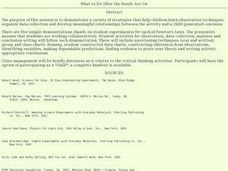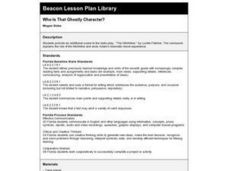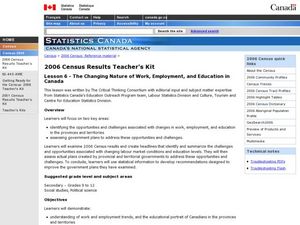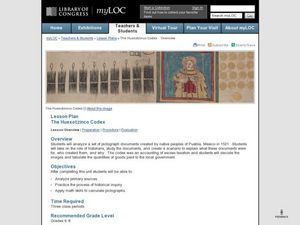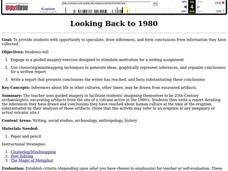Curated OER
The Dog Days of Data
Learners are introduced to the organization of data This lesson is designed using stem and leaf plots. After gather data, they create a visual representation of their data through the use of a stem and leaf plot. Students
drawing...
Curated OER
Investigation 3 - Examining Your Fossil
Fourth graders examine the fossils they made previously. They examine the details of the fossil with a hand lens and come up with conclusions about the fossils. They record what they see and draw conclusions about the environment of the...
Curated OER
How to "Read" an Artifact
Students discuss the types of information they can get from artifacts. In groups, they practice "reading" artifacts and determining their usage. They use inferences to test against official information about certain pieces. They also...
Curated OER
What To Do After The Hands-Are-On
Students perform various demonstrations for each of Newton's Laws, collect data, and write a conclusion for each.
Curated OER
Learning From Leaves: A Look at Leaf Size
Students measure and analyze leaves from various environments. They discuss the environments, and make inferences about environmental variables that could have contributed to the differences in leaf size and texture.
Curated OER
Sun, Shadows, Surface Structure...and the Face on Mars
Students use light and shadow information to make inferences regarding the three dimensional shapes of specific objects photographed on the surface of Mars. Limitations of the of the data provided are discussed and entries made into the...
Curated OER
Acid and Base Testing 2
Students design and conduct an experiment on unknown solutions after studying descriptions of indicators and the way in which they identify acids and bases. Students must gather, organize, and analyze data as well as make inferences...
Curated OER
Bibim Bap For Dinner
Young scholars participate in a literature analysis while reading the children's book "Bibim Bap For Dinner". The teacher performs a guided reading with the students while focusing on the skill of recognizing the main theme of the book....
Curated OER
African Dance: Drumbeat In Our Feet
Second graders read "African Dance: Drumbeat in Our Feet". In groups, they identify the message of the story and discuss a personal experience that relates to a part of the book. They practice reading fluently as a class and making...
Curated OER
Circles Minilab
Young scholars learn how to measure the diameter and circumference of a circle. For this circle lesson, students organize their data to create a graph. Young scholars utilize their graph to make an inference about the slope of pi.
Curated OER
Who Is That Ghostly Character?
Eighth graders listen to a taped version of the radio play, "The Hitchhiker". They write a conclusion to the play and work with a partner to evaluate it before a final revision.
Curated OER
Harry Potter Research Project
Young scholars work together to complete a research project on Harry Potter. They write a research question and develop a survey to give to their classmates. Using the results, they create a graph and draw conclusions about the data...
Curated OER
Understanding Primary Sources
Pupils draw conclusions from primary sources and share information and interpretations with a small group. They are introduced to the Jigsaw technique. Students discuss why a grocery receipt would be a primary source. They brainstorm...
Curated OER
Atomic Theory, Structure, and Symbols
For this atomic theory worksheet, students review the observations that led to the conclusion of the atom having a positively charged nucleus. Students compare atomic number and mass number and explain how the discovery of subatomic...
Curated OER
Event Graphic Organizer
For this event graphic organizer worksheet, students identify an event, record details, list prior knowledge, make inferences, and make a conclusion.
Curated OER
The Fat and the Lean
Students collect data on calorie intake. In this algebra lesson plan, students use the collection of data to make better eating decisions. They investigate the nutritional value in food using a graph and draw conclusion from their findings.
Curated OER
Moot Court Preparation
Twelfth graders prepare themselves for a mock moot court. In groups, they are presented with an overview of each activity and research appellate cases related to the topic given to them. They identify regions of the country that have...
Curated OER
The Role of a Plantation Mistress
Students investigate the role of a plantation mistress. In this American history lesson plan, students examine the household accounts kept by Thomas Jefferson's wife. Students decide what Martha Wayles Jefferson's responsibilities may...
Curated OER
The Changing Nature of Work, Employment, and Education in Canada.
High schoolers identify the effect caused by change of employment and education. In this statistics lesson, students analyze data and draw conclusions. This assignment tests high schoolers' ability to use data correctly.
Curated OER
Mystery of the Maya
Pupils examine a piece of pottery and make conclusions about the culture. They demonstrate the skills used in digging at a dig site. They also make inferences about the responsibility archaeologists have when excavating a site.
Curated OER
Lesson PlanThe Huexotzinco Codex
Students examine primary sources that include pictographs from Puebla, Mexico. In this Huexotzinco Codex instructional activity, students perform historical analysis as they investigate the codex as they make inferences and draw...
Curated OER
The Huexotzinco Codex
Students examine primary sources and perform historical analysis. In this Huexotzinco Codex instructional activity, students investigate the codex as they make inferences and draw conclusions
Curated OER
Scientific Inquiry
Middle schoolers make inferences about what activities occur at different places in school. They form a hypothesis as to how space is used. They simulate how archeaologists explore past people by designing and conducting a research project.
Curated OER
Looking Back to 1980
Pupils use clustering/mind mapping techniques to generate ideas, graphically represent inferences, organize their conclusions and write a report that presents conclusions the writer has reached, and facts substantiating those conclusions.





